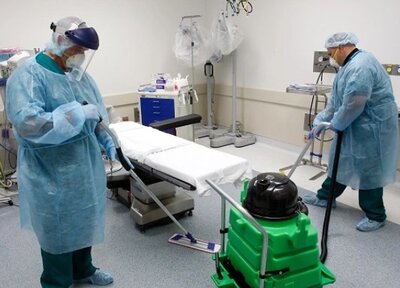How to Prepare Your Healthcare Facility for Seasonal Flu
Flu season is just around the corner. If you work in a healthcare facility, your risk of exposure to this seasonal illness increases every time you go to work. Once you're exposed, you may either get sick or spread the flu to your patients and coworkers. That’s why it’s so important to mitigate seasonal flu risks for staff and patients before flu season actually hits. Use this guide from ServiceMaster Clean to prep your healthcare facility for the seasonal flu.
What Is Seasonal Flu?
Seasonal flu, or seasonal influenza, happens annually. This virus usually peaks between December and February. According to the Centers for Disease Control and Prevention (CDC), the flu can cause mild to severe illness, and at times can even lead to death. While vaccines are designed to help with seasonal flu, the following groups of people have a high risk for flu complications every year:
Children
Elderly
Pregnant women
Chronically ill
Teach Employees to Spot Seasonal Influenza Symptoms
Being able to spot flu symptoms can help you and your coworkers identify any patients that may have this sickness, allowing you to work more diligently to contain germs. Some common signs and symptoms of the flu include the following:
Fever or chills
Fatigue
Sore throat
Cough
Runny or stuffy nose
Muscle and body aches
Headache
Implement Seasonal Flu Practices
Flu season may be short, but it can take a toll on your employees. Give them the proper guidance by providing information and implementing flu season practices in your office. The CDC recommends the following tips to prepare your facility for the flu:
Encourage employees to get influenza vaccinations annually. Vaccinated employees can help reduce the risk of a flu outbreak in your office.
Advise sick employees to stay home. If an employee is experiencing flu-like symptoms, they should stay home until at least 24 hours after their fever is gone.
Encourage regular hand washing. Washing your hands with soap and water as well as using hand sanitizer in between washes can help reduce the spread of germs. Use our healthcare hand washing guidelines for more details on how to properly follow hand hygiene within a healthcare setting.
Educate employees on respiratory hygiene. Covering your mouth with tissues when you sneeze or cough can help contain germs.
Remind employees to clean their workstations. Disinfect healthcare workstations often, including high-touch items like phones, desks and computers.
Flu Season Cleaning Procedures
Once flu season has hit, it’s important to stay on top of the cleaning schedule to minimize all germs, bacteria and viruses lingering in the facility. Follow these tips to reduce the spread of influenza in your facility:
Use disinfecting products or wipes for high-touch areas. Countertops, phones reception areas and restrooms should be disinfected multiple times each day.
Wipe down hard surfaces daily. This includes desks, counters and shared spaces.
Have upholstery cleaned regularly. Waiting areas and other spaces where employees and patients congregate must be cleaned frequently to reduce the spread of illness.
Remove waste and clean trash cans daily. Discard of waste in proper areas as often as possible throughout the day. Then, at the end of the day, trash cans should be wiped down with a disinfecting product.
Hire a Professional Cleaning Crew
Whether your facility is small or large, you still face the same risks of flu exposure. To help reduce your risk of a seasonal flu outbreak in your office, hire the experts at ServiceMaster Clean. Our healthcare cleaning services have been developed in recognition of best practices and procedures set forth by leading industries like OSHA and the CDC. Contact us to discover how we can help with overall environment improvement, risk reduction, and infection control and prevention in your facility.









